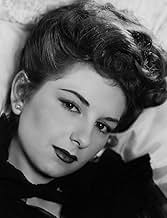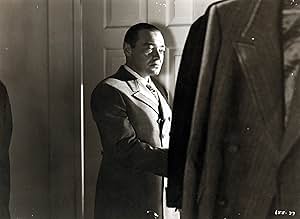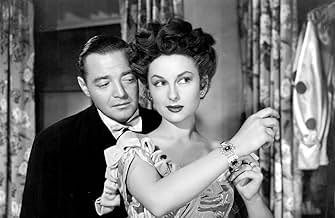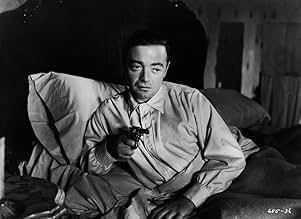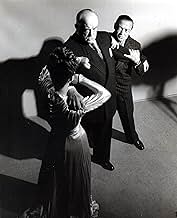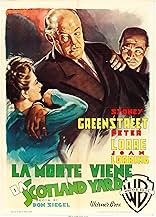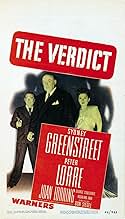IMDb RATING
7.2/10
3.1K
YOUR RATING
After an innocent man is executed in a case for which he was not responsible, a Scotland Yard superintendent finds himself investigating the murder of his key witness.After an innocent man is executed in a case for which he was not responsible, a Scotland Yard superintendent finds himself investigating the murder of his key witness.After an innocent man is executed in a case for which he was not responsible, a Scotland Yard superintendent finds himself investigating the murder of his key witness.
Jimmy Aubrey
- Newsboy
- (uncredited)
Leah Baird
- French Charwoman
- (uncredited)
Wilson Benge
- Cockney
- (uncredited)
Barry Bernard
- Pub Keeper
- (uncredited)
Billy Bletcher
- Gravedigger
- (uncredited)
Colin Campbell
- Simpkins
- (uncredited)
Herbert Clifton
- Englishman
- (uncredited)
- Director
- Writers
- All cast & crew
- Production, box office & more at IMDbPro
Featured reviews
I don't know what to say about the other reviews here(better to say nothing as their insights offer that suitable response). This is a great film with a great pairing of that wonderful coupling of gargantuan Sydney Greenstreet and devilish, diminuative Peter Lorre. Grenstreet never was better as a Scotland Yard superintendant who mistakenly sends an innocent man to his death. He is forced out of his job by another aspiring detective played with relish by George Coulouris. Greenstreet remarks, "He underestimated the size of my britches." And so he did! Greenstreet was that special kind of actor that draws you to his every word, action, and deed. His refinement of speech and larger-than-life presence greatly enhance the film. Lorre is Lorre, a funny character actor getting a break from villains for a chance. Lorre and Greenstreet aid each other very nicely and their scenes together are perhaps the most fun ones in the film. Behind all the actions of the two men is a fine Victorian mystery that has a good, hard-to-figure out ending. Director Don Siegel shows his deftness in capturing a dark Victorian setting. His scene exhuming a casket is particularly well-done. A fine film and an unfortunately all to rare chance to see Lorre and Greenstreet together.
Have always liked film noir, and there are many classics that are too numerous to list. Consider Sydney Greenstreet and Peter Lorre to be fine actors and always loved seeing them together, at their best they were dynamite. Don Siegel did some great films, with 'Dirty Harry' for example being iconic and 'Invasion of the Body Snatchers' (deservedly a landmark in its genre) and 'The Shootist' also among his best.
Thought 'The Verdict' to be a very good film. Much better than credit for, although well liked by a lot here also did read reviews from others that ranged from mixed to unimpressed. And it deserves to be much better known. Both Greenstreet and Lorre have done better, individually and together, and 'The Verdict' is not one of Siegel's best. They all come off well though, and do find the film to be much better than modestly suspenseful as has been described/indicated in reviews read.
It did slow down somewhat in pace at times in the middle. Joan Lorring to me felt bland in her role.
While the reveal and murderer identity was a genuine shock and had me floored, the staging of the ending itself is a touch melodramatic.
Both Greenstreet and Lorre excel though, in the last of their teamings, with roles well suited to them and play to their strengths. Greenstreet's is bigger and he shows no signs of fatigue or disinterest, while Lorre has the more colourful role and he is very entertaining to watch. Their chemistry is as riveting as one expects, bringing the right amount of tension and entertainment value. George Coulouris makes a big impression here as well.
Siegel, in his first feature film, does a more than credible job and while he did better films and his directing style became more refined this is hardly the work of an amateur. 'The Verdict' looks great, with moody photography and a handsomely rendered and vividly atmospheric Victorian setting. The music, while not mind-blowing, fits very well rather than being discordant with the atmosphere.
'The Verdict' further benefits from a tightly structured and intelligent script, that treats its viewers with respect, and to me the story did have suspense and thrills (not quite nail-biting but more than modest), going at a mostly crisp pace while meandering a little in the middle. Didn't find it predictable or implausible.
On the whole, very well done film. 7/10
Thought 'The Verdict' to be a very good film. Much better than credit for, although well liked by a lot here also did read reviews from others that ranged from mixed to unimpressed. And it deserves to be much better known. Both Greenstreet and Lorre have done better, individually and together, and 'The Verdict' is not one of Siegel's best. They all come off well though, and do find the film to be much better than modestly suspenseful as has been described/indicated in reviews read.
It did slow down somewhat in pace at times in the middle. Joan Lorring to me felt bland in her role.
While the reveal and murderer identity was a genuine shock and had me floored, the staging of the ending itself is a touch melodramatic.
Both Greenstreet and Lorre excel though, in the last of their teamings, with roles well suited to them and play to their strengths. Greenstreet's is bigger and he shows no signs of fatigue or disinterest, while Lorre has the more colourful role and he is very entertaining to watch. Their chemistry is as riveting as one expects, bringing the right amount of tension and entertainment value. George Coulouris makes a big impression here as well.
Siegel, in his first feature film, does a more than credible job and while he did better films and his directing style became more refined this is hardly the work of an amateur. 'The Verdict' looks great, with moody photography and a handsomely rendered and vividly atmospheric Victorian setting. The music, while not mind-blowing, fits very well rather than being discordant with the atmosphere.
'The Verdict' further benefits from a tightly structured and intelligent script, that treats its viewers with respect, and to me the story did have suspense and thrills (not quite nail-biting but more than modest), going at a mostly crisp pace while meandering a little in the middle. Didn't find it predictable or implausible.
On the whole, very well done film. 7/10
It is sad that Sydney Greenstreet's career in film was relatively brief - albeit marked by memorable performances in some truly great movies. He may well have had a successful life on the stage in the bulk of his acting life but his roles in film, in a brief eight year period, are all that is preserved from a long and distinguished career. We can only guess at the performances of a young and perhaps thinner Sydney Greenstreet. Despite all this he made his debut in The Maltese Falcon and then a few films later co-starred in Casablanca, more than making up for the delay in the transition to the big screen. The Verdict sees Greenstreet at his finest as the wizened superintendent whose career has been forever marred by an error of judgment that costs a man his life. This is a perfect whodunit/noir/murder mystery that is still gripping and tight despite the slightly melodramatic ending where revenge is possibly carried a little too close to the wire. Lorre is his usual sinister self, fascinated at the thought of exhuming a dead body and Colouris appropriate as the inept detective. Highly recommended.
When historians talk about the great screen pairings, one hears Tracy and Hepburn and Bogart and Bacall tossed around, as well as other male-female combinations. One of the truly great screen pairings of all time was Sydney Greenstreet and Peter Lorre - the former a large, sinister-looking man, and the latter a small, sinister-looking man with a quirky voice. They made nine films together, and when I see their names in a cast list, I know not to miss the movie.
"The Verdict," made in 1946, is a heavily atmospheric mystery set around 1890, when Supt. George Edward Grodman (Greenstreet) inadvertently sends an innocent man to the gallows for a woman's death and loses his job. The man claimed he had an alibi, but the person wasn't found until after the hanging. After many years in service, Grodman leaves with a blemish on his reputation. Replacing him is his ambitious nemesis, Supt. John R. Buckley (George Coulouris). Grodman begins to write the stories of his various cases, in the hopes that it can serve as a primer for police investigations.
When Arthur Kendall is murdered across the street from him, Grodman is pulled into the investigation, since Kendall's landlady (Rosalind Ivan) summoned him to help her get into the room. Kendall's aunt was the murder victim in the case where the innocent man was hanged. Before Kendall was killed, he visited Grodman, along with Grodman's friend Peter Emmric (Lorre) who lives in the same house as Kendall, and a politician, Clive Russell (Paul Cavanagh), who hates Kendall. Russell and Kendall come to blows outside of Grodman's house. Grodman now finds himself in a position of helping the man who replaced him.
This is an very clever mystery, brought up a few levels by the acting of Greenstreet and Lorre. Paul Cavanagh and George Coulouris turn in good performances in smaller roles, and Joan Lorring is fine as a dance hall girl who was involved with Kendall. Though not a great beauty, she has a great figure and conveys a low class background.
Highly recommended. With the Victorian times, the heavy fog, and the presence of Cavanagh and Coulouris, the film reminds one of the Sherlock Holmes movies.
"The Verdict," made in 1946, is a heavily atmospheric mystery set around 1890, when Supt. George Edward Grodman (Greenstreet) inadvertently sends an innocent man to the gallows for a woman's death and loses his job. The man claimed he had an alibi, but the person wasn't found until after the hanging. After many years in service, Grodman leaves with a blemish on his reputation. Replacing him is his ambitious nemesis, Supt. John R. Buckley (George Coulouris). Grodman begins to write the stories of his various cases, in the hopes that it can serve as a primer for police investigations.
When Arthur Kendall is murdered across the street from him, Grodman is pulled into the investigation, since Kendall's landlady (Rosalind Ivan) summoned him to help her get into the room. Kendall's aunt was the murder victim in the case where the innocent man was hanged. Before Kendall was killed, he visited Grodman, along with Grodman's friend Peter Emmric (Lorre) who lives in the same house as Kendall, and a politician, Clive Russell (Paul Cavanagh), who hates Kendall. Russell and Kendall come to blows outside of Grodman's house. Grodman now finds himself in a position of helping the man who replaced him.
This is an very clever mystery, brought up a few levels by the acting of Greenstreet and Lorre. Paul Cavanagh and George Coulouris turn in good performances in smaller roles, and Joan Lorring is fine as a dance hall girl who was involved with Kendall. Though not a great beauty, she has a great figure and conveys a low class background.
Highly recommended. With the Victorian times, the heavy fog, and the presence of Cavanagh and Coulouris, the film reminds one of the Sherlock Holmes movies.
The Verdict is directed by Don Siegel and adapted to screenplay by Peter Milne from the novel The Big Bow Mystery written by Israel Zangwill. It stars Sydney Greenstreet, Peter Lorre, George Coulouris, Joann Lorring, Rosalind Ivan and Paul Cavanagh. Music is by Frederick Hollander and cinematography by Ernest Haller.
When Scotland Yard superintendent George Grodman (Greenstreet) in error sends an innocent man to be hanged at Newgate Prison, he is forced to retire in shame. Replaced by the irritable and obnoxious John Buckley (Coulouris), Grodman gets an unexpected opportunity to embarrass Buckley when a tricky murder occurs in a seemingly locked room
The scene is set from the off, it's 1890 at Newgate Prison in London and a man is hanged off camera. Fog and gas lighted shadows cloak the events to enhance the macabre feel of the event. For the next 80 odd minutes 90% of the story will involve fog or shadows, or both at the same tame, making this very much of interest to the Gothic/noir fan. The story had previously formed the basis of a 1934 film titled as The Crime Doctor.
The story itself is most intriguing, the mystery element remains strong throughout as the suspects are deftly dangled in the plotting by Siegel (directing his first full length feature) and Milne. Just how could a murder be committed in a room completely locked from the inside? The makers ensure that certain areas are kept grey to give off a feeling of confusion, motives and means are deliberately matter of fact and the trusted pairing of Greenstreet and Lorre is a deliciously odd-ball little and large act.
It would be harsh to decry the production for being stage-bound, because although it inevitably is, it doesn't hurt the mood of the picture at all. The story is acted and directed with skill and Haller's photography is in turn beautiful and suitably sinister. 8/10
When Scotland Yard superintendent George Grodman (Greenstreet) in error sends an innocent man to be hanged at Newgate Prison, he is forced to retire in shame. Replaced by the irritable and obnoxious John Buckley (Coulouris), Grodman gets an unexpected opportunity to embarrass Buckley when a tricky murder occurs in a seemingly locked room
The scene is set from the off, it's 1890 at Newgate Prison in London and a man is hanged off camera. Fog and gas lighted shadows cloak the events to enhance the macabre feel of the event. For the next 80 odd minutes 90% of the story will involve fog or shadows, or both at the same tame, making this very much of interest to the Gothic/noir fan. The story had previously formed the basis of a 1934 film titled as The Crime Doctor.
The story itself is most intriguing, the mystery element remains strong throughout as the suspects are deftly dangled in the plotting by Siegel (directing his first full length feature) and Milne. Just how could a murder be committed in a room completely locked from the inside? The makers ensure that certain areas are kept grey to give off a feeling of confusion, motives and means are deliberately matter of fact and the trusted pairing of Greenstreet and Lorre is a deliciously odd-ball little and large act.
It would be harsh to decry the production for being stage-bound, because although it inevitably is, it doesn't hurt the mood of the picture at all. The story is acted and directed with skill and Haller's photography is in turn beautiful and suitably sinister. 8/10
Did you know
- TriviaFeature directorial debut of Don Siegel.
- GoofsThe story, set in the 1890s, makes reference to the Courts of Appeal. These courts, however, were not established in the UK until 1907. Before 1907 only the Home Secretary could commute a death sentence.
- Quotes
Supt. George Edward Grodman: I feel as if I were drinking at my own wake.
- ConnectionsReferenced in Burke's Law: Who Killed Merlin the Great? (1964)
- How long is The Verdict?Powered by Alexa
Details
- Release date
- Country of origin
- Languages
- Also known as
- El veredicto
- Filming locations
- Production company
- See more company credits at IMDbPro
- Runtime1 hour 26 minutes
- Color
- Aspect ratio
- 1.37 : 1
Contribute to this page
Suggest an edit or add missing content


